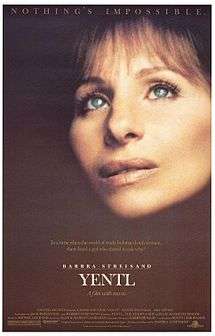Yentl

Barbra Streisand directed, co-wrote, co-produced, and starred in this 1983 film about a Jewish girl in Poland who becomes a Wholesome Crossdresser so she can receive an education. The movie is set in the early 20th Century and was partially filmed in Prague. As the lead character, Streisand got to belt out several memorable songs.
The script was based on a 1968 play written by Leah Napolin which was itself based on a short story from the early 1960s by Isaac Bashevis Singer. Singer ultimately panned the movie production, but it became a box office hit. The movie won an Academy Award for Best Original Score; the movie won a Best Picture Golden Globe in the musical/comedy category and Barbra Streisand became the first woman to win a Best Director Golden Globe Award for the film. Amy Irving, who played Hadass, has the rare distinction of being nominated for both the Best Supporting Actress Oscar as well as the Golden Raspberry Award for Worst Supporting Actress - only the latter of which she "won". (The Razzies also nominated Barbra for Worst Actor and the movie for Worst Score, which is either a sign that they're meant to be tongue in cheek or a sign that some people are deeply divided about its merits.)
- All Love Is Unrequited: Both Yentl for Avigdor and Avigdor for Hadass (though she loves him, they're prevented from consummating it).
- Chick Flick: Of the drama variety.
- Different for Girls
- "I Am Becoming" Song: "No Matter What Happens", "A Piece of Sky".
- Incredibly Long Note: Barbra Streisand's final number (Papa Can You Hear Me/A Piece of Sky); her last note clocks in at over 20 seconds. Babs in general is famous for these.
- The Ingenue: Hadass.
- Ironic Echo: There are two: "Nothing's impossible!", first uttered to the titular character by her study partner Avigdor after he asks her/him to marry his ex-fiancee, later uttered by her when Avigdor almost leaves town after she refuses the favor. The other is "God will understand. I'm not so sure about the neighbors," first said by Yentl's father when asked why he is closing the windows if God will understand that his teaching her Talmudic law, which was forbidden to women at the time, is not with ill intent. It is said again by her to Avigdor's ex-fiancee (now her legal wife) in the same context.
- I Want My Beloved to Be Happy: Avigdor for Hadass when his engagement to her is broken off by her parents and proposes that Yentl marry her. Yentl for Avigdor when she decides to reveal herself and leave Hadass to him while she leaves for America.
- "I Want" Song: "Where is it Written?".
- Love Triangle: A slightly unconventional one. As Yentl puts it:
He loves her, she loves him, he likes me, I like her, and I've reason to think she likes me.
She keeps him, he keeps her, I keep things as they were, it's a perfect arrangement for three!
- It gets more complicated later when Hadass starts to fall in love with Yentl/Anshel.
- Sweet on Polly Oliver: After the heroine reveals her, ahem, "self" to her love interest, he bitches her out for a while, and then reveals the following to her:
"I didn't want to touch you. I didn't know why. I thought there was something wrong with me. I loved you... "
- Justified. Yentl's disguise is pretty crappy (much worse than the equivalent in Tootsie or Mrs. Doubtfire for example). The miracle is that anyone thought she was a man, not that a straight man was attracted to her. It more makes you wonder about Avigdor's fiancee.
- Sweet Polly Oliver: The main character became a man in order to attend a school in Jewish Talmudic Law, which was forbidden for women at the time. It made for some really weird love triangles.
- Twelfth Night Adventure: The film was set during a time when women were not to become educated.